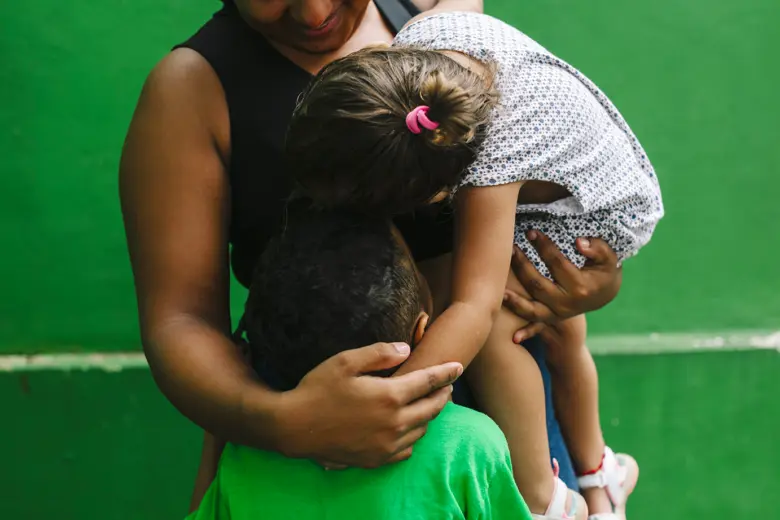
A Guatemalan mother and her children at a shelter for refugees and asylum-seekers in Tapachula, southern Mexico. © UNHCR/Gabo Morales
Participants at UN General Assembly side event stress that co-responsibility and solidarity are needed now more than ever.
A high-level event on the sidelines of the UN General Assembly on Wednesday called for solidarity with people forced to flee Central America and for stronger international backing to address forced displacement in the region.
The meeting of the Support Platform of the Comprehensive Protection and Solutions Framework (known by its acronym in Spanish, MIRPS) was convened by Spain and attended by representatives of several UN member states, international financial institutions, academics and civil society from various Central American countries.
Opening the meeting, UN High Commissioner for Refugees Filippo Grandi, made a plea for large-scale support to countries in Central America affected by forced displacement. He warned that without increased support, many more people could join the hundreds of thousands of families who have fled.
“Central America needs, now more than ever, the support of the international community, through coordinated and comprehensive work to address both the humanitarian and development agendas,” Grandi said. The High Commissioner also commended the role played by El Salvador – which currently holds the MIRPS Pro-tempore Presidency – in leading efforts to address and reduce forced displacement across the region.
Nearly 900,000 people have been forced to flee violence and persecution in Central America. Among them are at least 790,000 people displaced within or from northern Central America, and over 100,000 from Nicaragua, who without support are at risk of remaining uprooted indefinitely.
The situation has become all the more dire since the start of the COVID-19 pandemic, with the Americas as a whole being the region most badly hit by the disease. Closed borders and strict lockdowns measures have made a bad situation worse for many of the forcibly displaced, and there is concern that lockdowns have left parts of the population under the control of gangs and criminal groups, which may drive further displacement in the future.
“We are all conscious that the COVID crisis will only aggravate the pre-existing situation [in the region]. Therefore, it is very important that we mobilize renewed efforts to assist the region,” said Spain’s Foreign Minister Arancha Gonzales Laya.
Luis Almagro, Secretary General of the Organization of American States, stated that the responsibility to protect those displaced by violence and persecution belongs “to us all” and underlined the importance of the private sector’s strategic position and vision, which make it “an instrumental ally in the comprehensive response” to forced displacement in the region.
El Salvador highlighted the importance of keeping highly visible need to address displacement in the region, and expand the base of support for MIRPS countries, including by calling for engagement of international financial institutions and the private sector.
“We need to try to find solutions for what is a real human drama and as we really cannot afford the luxury to turn away our sight [from this problem],” said Alexandra Hill Tinoco, El Salvador’s Foreign Minister.
Among the commitments made to the MIRPS during the meeting, Spain pledged to provide assistance in building asylum capacity, Canada offered support with resettlement programmes and the European Union pledged additional support to development. The Inter-American Development Bank reconfirmed its focus on supporting both transit countries and countries from where displacement originates; while the United States reaffirmed its commitment to provide financial support to address the crisis. Canada also expressed interest in holding the next presidency of the MIRPS Support Platform when Spain’s tenure ends next year.
Complementing the humanitarian response, the Comprehensive Development Plan for El Salvador, Guatemala, Honduras and south and southeast Mexico that is being coordinated by the Economic Commission for Latin America and the Caribbean (ECLAC) will be key in helping to address root causes of displacement in countries of origin and boost integration, inclusion and solutions in countries of destination. “One of the main aspects of [this plan] is the comprehensive management of the migration cycle in countries of origin, transit and destination,” said Alicia Barcena, Executive Secretary of ECLAC.
The MIRPS is a tangible application of the Global Compact on Refugees that includes Belize, Costa Rica, El Salvador, Guatemala, Honduras, Mexico and Panama. Drawing on a robust tradition of regional cooperation, these countries lead the response to forced displacement in the region. UNHCR, the UN Refugee Agency and the Organization of American States Organization provide the Technical Secretariat for MIRPS states to guide the implementation of national and regional action plans.
For more information and interview requests:
In Ottawa, Melanie Gallant, Tel. +1 (613) 850-1268, gallant@unhcr.org


